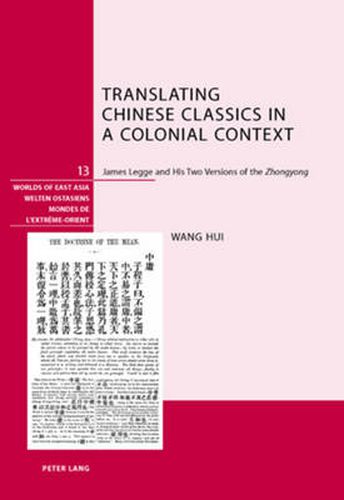Readings Newsletter
Become a Readings Member to make your shopping experience even easier.
Sign in or sign up for free!
You’re not far away from qualifying for FREE standard shipping within Australia
You’ve qualified for FREE standard shipping within Australia
The cart is loading…






James Legge’s (1815-1897) translations of the Confucian classics have long been venerated as the peak and standard of sinological translation, with little attention being paid to the traces of missionary and orientalist discourse within these awesome tomes. This book subjects Legge’s Confucian translations to a postcolonial perspective, with a view of uncovering the subtle workings of colonialist ideology in the seemingly innocent act of translation. Combining close textual study with rich contextual information, the author uses the example of Legge’s two versions of the Zhongyong to illustrate two distinctive stages of his sinological scholarship: missionary orientalism during his Hong Kong years (1843-1873), culminating in the production of The Chinese Classics, and academic orientalism during his Oxford professorship (1876-1897), as reflected in his Sacred Books of China. Legge grew hermeneutically more open in his life-long encounter with the Confucian texts, yet his translation did not entirely transcend the colonialist discourse of the day. This in-depth case study highlights the importance of taking an ethical stance in cross-cultural translation, and has much to offer to postcolonial translation studies.
$9.00 standard shipping within Australia
FREE standard shipping within Australia for orders over $100.00
Express & International shipping calculated at checkout
James Legge’s (1815-1897) translations of the Confucian classics have long been venerated as the peak and standard of sinological translation, with little attention being paid to the traces of missionary and orientalist discourse within these awesome tomes. This book subjects Legge’s Confucian translations to a postcolonial perspective, with a view of uncovering the subtle workings of colonialist ideology in the seemingly innocent act of translation. Combining close textual study with rich contextual information, the author uses the example of Legge’s two versions of the Zhongyong to illustrate two distinctive stages of his sinological scholarship: missionary orientalism during his Hong Kong years (1843-1873), culminating in the production of The Chinese Classics, and academic orientalism during his Oxford professorship (1876-1897), as reflected in his Sacred Books of China. Legge grew hermeneutically more open in his life-long encounter with the Confucian texts, yet his translation did not entirely transcend the colonialist discourse of the day. This in-depth case study highlights the importance of taking an ethical stance in cross-cultural translation, and has much to offer to postcolonial translation studies.